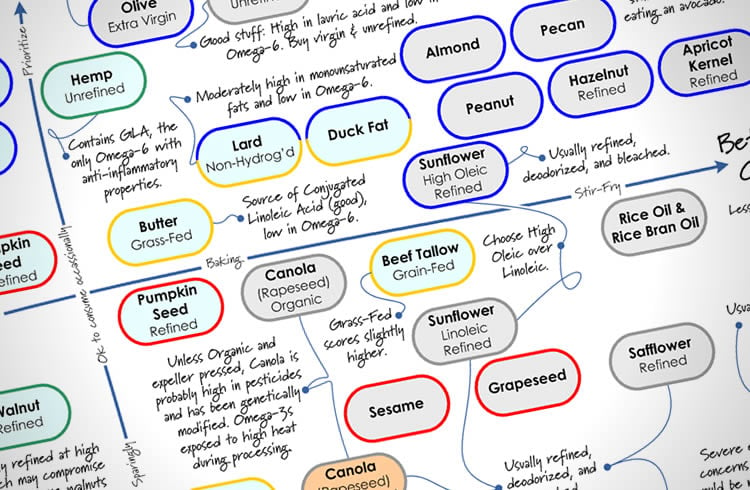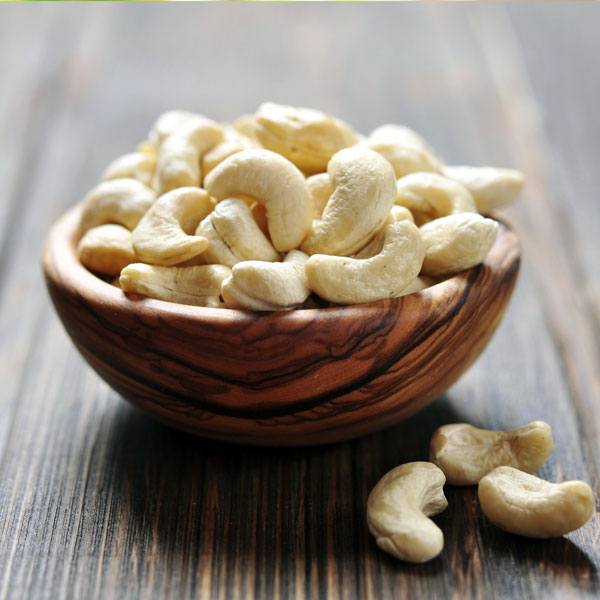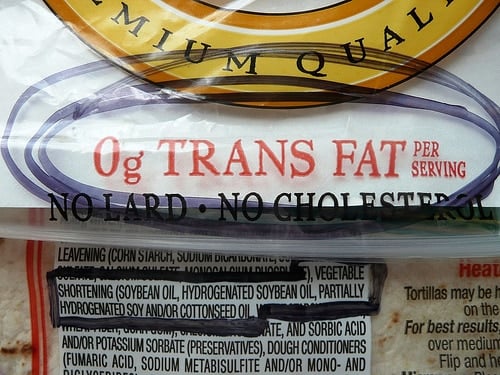The Cooking Oil Comparison Chart
Last Updated June 28, 2020 · First Published February 13, 2012

You already know that Extra Virgin Olive Oil is good for you. But what do you choose when it’s time to branch out and try something new? There are a lot of cooking oils out there, and many have misleading health claims on the label. It can be a bit overwhelming when you walk down the oil aisle in the store.
Some oils are very healthful, others not so much — and for different reasons. How do you know what’s really important when choosing a cooking oil? And how do you keep track of them all?
Why, with The Cooking Oil Comparison Chart, of course!
I’ve teamed up with Andy Bellatti, MS, RD, to help answer these questions with this chart. (If you don’t already follow Andy, you’re missing out.) We’ve created a one-page, printable PDF that you can take with you to the grocery story (or stick up on your fridge), that will help guide you through the labyrinth of oils.
We focused on two main factors, healthfulness and temperature-sensitivity, since some oils lose their health benefits when heated. Using a grid that makes it easy to see where each oil falls on the spectrum, you’ll be able to tell at a glance which oils to use for your salad, and which to use for your next stir-fry — and which oils to avoid altogether. We’ve also included some secondary details about each oil, along with some important pitfalls to watch out for.
Andy has written a post on his blog explaining the science behind our oil comparisons, so you’ll know why each oil is where it is on the chart. So click on over to Andy’s post to get the nitty-gritty, and then come back here and get the PDF.
The Cooking Oil Comparison Chart
792kb PDF, Last updated June 20, 2017
—
If you’d like to share this chart on your own website or blog, please be respectful (and law-abiding) and share it simply by linking directly to this post. Please do not link directly to the PDF or copy the entire chart to your own site. You may use the image at the top of this post on your own page, if you like. Thanks!
—
PS – Huge thanks to Andy for jumping on board when I proposed this project to him. I had a ton of fun collaborating with him, and appreciate his enthusiasm and expertise!
—
You may also like my other printables:
The Healthy Breakfast Flowchart
The Smoothie Flowchart
A Guide to the My Plate Icon
How to Read the Nutrition Facts Panel





















Im a 46 year old man who had a recent heart attack. I know that frying food is bad for you, but some foods just need to be. I understand thst olive oil good to fry with, but not so good a flavor for pancakes and such. I have never been through this and could use some help. thanks
Chis H
Regarding your situation. Sorry to hear about your heart attack and hope you are recovering okay.
Just saw on Dr. Oz this morning that cooking with coconut oil is one of the healthiest oils we can cook with. He even recommended using it like butter on toast. Says it lowers cholesterol (new studies) and is healthier all around.
It has a hight smoke point than olive oil.
Also, if you happen to see a few of my other posts, rice bran oil is excellent in many ways. You can check them out at California Rice Oil Company web site.
Hi Chris
My doctor said originally there was only two fats, lard and butter. All the remainder were man-made.
The ONLY oil to use was coconut oil which I use.
Do your research please
I don’t know who sponsors this website but it seems that many are ignoring some common facts regarding the use of certain products. I am appalled that canola is even a part of the discussion since it is first of all a GMO product and secondly that it is a known carcinogen. However, the recent inquiry by June Wood has made me realize that the message is not getting through. Remember, we are not garbage cans. The things we put into our body have consequences. Some good and some bad. Margarine is on the latter side. Don’t be blinded by the press. They are paid to say what they say about the foods we eat that are produced by Agribusiness. PLease seriously consider the following. Margarine was originally manufactured to fatten turkeys. When it killed the turkeys, the people who had put all the money into the research wanted a… Read more »
We were very specific in the chart about the placement of margarine and canola oil. They’re towards the bottom, which indicates that we think they’re not healthy.
Andrew,
I appreciate the placement, if they have to be placed. And being a little facetious, I don’t see Quaker State or Penzoil on your chart and IMHO, margarine and canola belong in the same category except they won’t kill you quite as quickly. Thanks for taking the time to respond.
Jack, your passion for health is admirable. I do not disagree that margarine is unhealthy. I hope you consider a couple of other items with your comments. Because margarine and other unhealthy products are marketed and placed on store shelves, this chart would not be a good educational tool if they were left out. To many of the public, they appear just next to and much cheaper options on store shelves. Your humble opinion hasn’t considered that motor oil does not appear in the dairy case of the grocery stores I am familiar with. I am not connected with this site, the chart or the people who developed it. I do believe in educating with easy to understand wording. I hope you will consider that your analogy of margarine being one molecule away from plastic may not be the best illustration. Let me explain. Simply put, there are other substances… Read more »
Your Cooking Oil Comparison chart shows hydrogenated margarine but not non-hydrogenated. I’m interested in knowing how non-hydrogenated margarine stacks up.
Thanks!
Hi June. Generally the non-hydrogenated margarines are a mix of other oils — so it was too complicated to include them in this one-page chart. Check the ingredients, and then look up the individual oils. Additionally, be careful of the ones that say “trans fat free” — as they may still contain some hydrogenated oils. Another important reason to check the ingredients list. Personally, I’ve found that these spreads have more than just oils in them, there are other ingredients that I just don’t want to be eating. Hope that helps!
My bottles of Mustard Seed Oil (Australian) list this info:
saturated fat 5.5%
polyunsaturated 46%
monounsaturated 46%
cholesterol 0%
flash point 215C (410F)
cold pressed
Concerned about GMOs, we’ve switched to grape seed oil for cooking. Still use olive oil but in extreme moderation. ALL oils we use are organic.
Oh thanks that going to come handy!
terribly sorry guys. but according to my sources, there is no such thing as organic canola. If you can find a place where it is grown organically I’d like to know. by the way, GMO does NOT qualify as “organic”. the toxins produced in the rapeseed is designed to repel pests. It has it’s own built in insecticide which is expressed into the oil
I did not see rice bran oil anywhere on your chart. by far the best second only to EVOO. When cooking with EVOO, frequently the problem is the low smoke point. By mixing rice bran oil in with the EVOO, you get the flavor and health benefits but you significantly raise the smoke point, thereby reducing the carcinogen level produced by smoking the EVOO.
Hi Jack. I’m curious to know what your sources are. Here’s an Organic Canola oil, sold by the Spectrum brand. Still refined, and we still don’t necessarily recommend it, but it does exist:
http://www.spectrumorganics.com/?id=6#j42
Rice Bran Oil is on the chart, on the right side in the middle of the page. It does indeed have a higher smoke point, which is why it’s further to the right.
Wonderful UTube movie/discussion on the effects of oils, etc. Shocking about olive oil!
Hi There,
Great chart to get a very easy understanding about cooking oils. There is one more Oil and curious to know about though, and I have researched a bit on the web, but got very conflicting facts about it, and it doesn’t appear in this chart either. Mustard Oil, which is quite widely used for cooking in many parts of India. Kindly throw some light on the nutritional facts on the same.
Thanks!!
No one has mentioned ghee which is excellent for cooking and doesn’t go rancid. I make my own from organic butter. I have read many sources that say it is good for you ( in moderation). Just be sure it’s from grass fed cows.